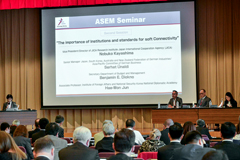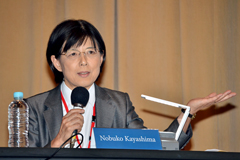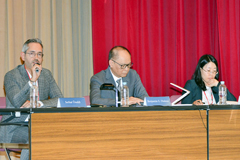Asia-Europe Meeting (ASEM) Seminar Underlines the Importance of Sustainable Connectivity
2018.10.05
On September 12, 2018, the Asia-Europe Meeting (ASEM) seminar "Sustainable Connectivity and Quality Infrastructure" was held at Mita Conference Hall in Tokyo. The seminar was co-hosted by the Ministry of Foreign Affairs of Japan and the EU.
The ASEM is a forum for dialogue between Asia and Europe. At the ASEM Summit held in 2016, strengthening of both hard and soft connectivity through investment in quality infrastructure, and mainstreaming of connectivity in all ASEM-related initiatives were selected as a pillar of important ASEM activities in the future. The seminar was conducted in conjunction with the ASEM Senior Officials’ Meeting held in Tokyo to promote such ASEM initiatives.

The second session was titled“The Importance of Institutions and Standards for Soft Connectivity”
The seminar consisted of three sessions. The theme of the first session was “Why Does the World Need Connectivity and Quality Infrastructure?” The second session was “The Importance of Institutions and Standards for Soft Connectivity,” and the third session was “Challenges of Promoting Quality Infrastructure and Sustainable Connectivity in and between Asia and Europe from the Viewpoint of Each ASEM Sub-region.”
Nobuko Kayashima, then director of JICA Research Institute, served as a moderator for the second session, "The Importance of Institutions and Standards for Soft Connectivity." Serhat Uenaldi, senior manager for Japan, South Korea, Australia and New Zealand of Federation of German Industries (BDI), Benjamin E. Diokno, secretary of Department of Budget and Management of the Philippines, and Hae-Won Jun, associate professor, Department of European and African Studies, Institute of Foreign Affairs and National Security (IFANS), Korea National Diplomatic Academy (KNDA) participated as panelists.
Kayashima first addressed the importance of updating regulation of cross-border activities, modernizing customs, facilitating trade, and improving IT and digital links and other "soft" aspects, in addition to establishing physical roads, railroads and other "hard" aspects of infrastructure to connect people, services, and goods from one region or country to another. She said the focus of the discussion would be on the importance of such soft connectivity as trade and investment, transportation and customs and digital connectivity.

Nobuko Kayashima, then JICA-RI director, served as a moderator for the second session
In the presentations of panelists, Uenaldi examined connectivity in the areas of trade and investment. He pointed out that Asia was the Germany's largest export partner. The EU has moved forward concluding free-trade agreements (FTA) with individual Asian countries, and has already vitalized mutual trade with South Korea. Further, although foreign direct investment (FDI) has decreased worldwide, investment in Asia has remained stable. Meanwhile, discussions in Germany regarding acceptance of FDIs have included risks such as the acquisition of German companies by Chinese companies. He explained that increased protectionism impacts negatively on the global system of free-trade networks, and that strengthening economic ties between the EU and Asia will also strengthen political cooperation.
Next, Diokno addressed connectivity in transportation and customs, commenting on the importance of simplifying the flow of trade and logistics, establishing consistent and efficient customs rules and procedures and other aspects of soft connectivity in promoting economic growth. He explained that insufficient investment in infrastructure in the Philippines over the past 50 years has resulted in traffic congestion, insufficient public transportation, decaying road networks and other problems, thereby hobbling economic growth and overseas capital investment. He introduced the “Build Build Build program”, in which a total of 16.7 to 18.8 trillion yen—the largest amount in the Philippines' history—will be invested in infrastructure development by 2022 with the aim of promoting economic growth and reducing poverty.
Jun emphasized the benefits of IT and digital connectivity, such as reduced costs caused by geographical distance in logistics and communication, the ability of the internet to facilitate cooperation between companies in the global value chain, and provision of opportunities for venture companies to participate in markets. Jun addressed technical, economic and social restrictions related to information on the internet, and pointed out social restrictions such as language barriers, differences between Asia and Europe regarding data openness, and concerns over cyber security and data protection.

From left to right: Serhat Uenaldi, Benjamin E. Diokno, and Hae-Won Jun
In the discussion that followed, Kayashima commented on the political, economic and cultural diversity of ASEM member countries, such as differences in the level of economic development, then posed the question of what challenges were involved in achieving soft connectivity in that context. Uenaldi responded by pointing out the importance of finding the right balance between competition and cooperation, since Asia and Europe are in a competitive economic relationship. In addition, nationalism, the rise of military governments and other aspects of the political culture in parts of Asia will also be significant issues. Diokno said the most difficult challenge was fund procurement. He explained that even within Asia there were wide differences between countries, for instance, some countries are lagging too much behind another to use public-private partnerships (PPP). Jun responded that one challenge was language. For example, many languages for each country are used on websites within the EU, and there is little English, so it is difficult for Asian people to access information. She explained that efforts by Asia and Europe to communicate in English would result in accumulation of more information and an increase in diversity.
Questions from attendees included topics such as responding to a sense of caution and protectionism regarding investment from overseas, the need to examine issues from educational and cultural perspectives, and the impact of social media.
Finally, Kayashima pointed out that diversity was a characteristic of ASEM, so inclusive connectivity was necessary. The cultural and social aspects of connectivity are also important. She closed the session by explaining that deeper interaction between people in business, tourism, and academia had the potential to resolve issues in political relationships between nations, and was expected to contribute to peace and stability of the region.

事業事前評価表(地球規模課題対応国際科学技術協力(SATREPS)).国際協力機構 地球環境部 . 防災第一チーム. 1.案件名.国 名: フィリピン共和国.

事業事前評価表(地球規模課題対応国際科学技術協力(SATREPS)).国際協力機構 地球環境部 . 防災第一チーム. 1.案件名.国 名: フィリピン共和国.

事業事前評価表(地球規模課題対応国際科学技術協力(SATREPS)).国際協力機構 地球環境部 . 防災第一チーム. 1.案件名.国 名: フィリピン共和国.

事業事前評価表(地球規模課題対応国際科学技術協力(SATREPS)).国際協力機構 地球環境部 . 防災第一チーム. 1.案件名.国 名: フィリピン共和国.

事業事前評価表(地球規模課題対応国際科学技術協力(SATREPS)).国際協力機構 地球環境部 . 防災第一チーム. 1.案件名.国 名: フィリピン共和国.
scroll